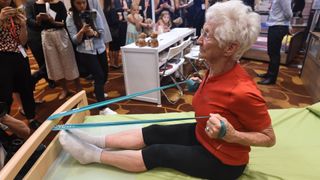Archaeologists discovered a walled city in the northern Saudi Arabian desert that was likely home to 500 people as far back as 2,400 B.C.
The experts believe the city’s roughly 1,000 years of use showed a growing urban complexity in the region.
The town was functionally subdivided into different areas, but also included towers and ramparts for defense.
A newly discovered ancient oasis in the Saudi Arabian desert shows that, centuries ago, the area had a completely unexpected level of urban sophistication. The remains of the walled and fortified city include towers, ramparts, organized zones of residential areas connected by small roads, a centralized area, a cemetery, and a place to cultivate food.
In a new study published in the journal PLOS ONE, a team of archaeologists (led by France’s National Center for Scientific Research) unveiled the discovery of an “exceptional Bronze Age fortified site called al-Natah,” located in the Khaybar oasis and uncovered by the Khaybar Longue Duree Archaeological Project. READ MORE...
A newly discovered ancient oasis in the Saudi Arabian desert shows that, centuries ago, the area had a completely unexpected level of urban sophistication. The remains of the walled and fortified city include towers, ramparts, organized zones of residential areas connected by small roads, a centralized area, a cemetery, and a place to cultivate food.
In a new study published in the journal PLOS ONE, a team of archaeologists (led by France’s National Center for Scientific Research) unveiled the discovery of an “exceptional Bronze Age fortified site called al-Natah,” located in the Khaybar oasis and uncovered by the Khaybar Longue Duree Archaeological Project. READ MORE...



